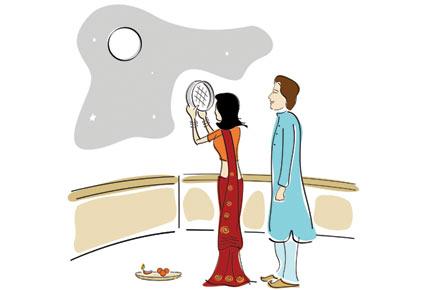While a fight over the meaning of Karva Chauth broke out online, I was at a conference on porn (no symbolism intended) having a parallel discussion on marriage with the activist Meena Seshu.

Karva Chauth
 While a fight over the meaning of Karva Chauth broke out online, I was at a conference on porn (no symbolism intended) having a parallel discussion on marriage with the activist Meena Seshu.
While a fight over the meaning of Karva Chauth broke out online, I was at a conference on porn (no symbolism intended) having a parallel discussion on marriage with the activist Meena Seshu.
ADVERTISEMENT
Meena asked what marks of marriage do Punjabi women wear. I hazarded the guess, “Maybe none,” as I’ve never spotted the sindoor or mangalsutra among the Punjabi women I know. “But you can kind of tell by demeanour,” I added, not a very scientific explanation that.

Meena said, “That’s interesting. You know, as feminists, many of us decided to stop wearing overt markers of marriage because we did not want that distinction between married and unmarried women to become the basis of stigmatising single women.”
I found this very moving. A simple act of loving, feminist solidarity, prescribing nothing to others. Rather, reaching out to others without necessarily giving up what you are. It’s a fundamental ideal of feminism — that while expanding one’s own choices, we do not feed off or curtail others’ choices and freedoms, but try to expand them.
The recent Karva Chauth discussion carried surprisingly little of this generosity. One side denounced Karva Chauth as a festival which celebrated servitude, and valued the husband’s long life but not that of the wife. The other side glorified it as a symbol of love. In the middle was a line, radiating moral judgment, marking one woman as more suitable than the other.
As a single person, I haven’t had to think much about Karva Chauth. As a child, I mostly found it funny when the women of my family, not a very subservient lot, kept Karva Chauth. There would be a movie excursion to keep hungry thoughts at bay. Once back they’d dress up for, “passing the parcel” as they called the ritual of passing the pooja plate round while narrating the vrat katha — which no one could narrate properly — feeling relieved when the moon came out. It’s also true, I never saw anyone touch their husband’s feet Barjatya style, but it’s possible many women in other households do.
Once, my unmarried Christian neighbour Sharon, produced herself with heavy mehendi and a wan look. On enquiry, she sheepishly admitted she was observing Karva Chauth because, well, boyfriend trouble, ha ha. Having only fasted for blood tests myself, I couldn't understand how anyone could fast when not required. But I guess, it was the equivalent of Hindus keeping Novena at Mahim church and contributing to Bombay’s great cosmopolitan practice of Unity in Traffic Jam every Wednesday. Religious benefit is a competitive field. People speculate in a variety of
stocks I suppose.
Here’s the thing though. When one married woman tells another that she’s better or more modern than her because she doesn’t keep Karva Chauth, you gotta scratch your head. I mean, clarify this — if you oppose patriarchy so much, how come you are part of patriarchy’s most fundamental unit, yaniki, marriage? If you have chosen to be, for whatever reason, it may be worth wondering about the complexities of choice.
Some may say they are redefining marriage in feminist terms. Others might say they are re-imagining rituals.
Following rituals does not fix us as backward, any more than not following them confirms us as progressive. I think Meena Seshu’s story shows us a way of solidarity. Whether observing or rejecting rituals, do we symbolically or literally deepen divisions between women? Do we simply assert our own choices or do we contribute to expanding the meaning of choice and possibilities of choice for others not like us?
We are all a work-in-progress. Let’s not be so sanctimonious. It’s a dead end and a dead bore.
Paromita Vohra is an award-winning Mumbai-based filmmaker, writer and curator working with fiction and non-fiction. Reach her at www.parodevipictures.com
 Subscribe today by clicking the link and stay updated with the latest news!" Click here!
Subscribe today by clicking the link and stay updated with the latest news!" Click here!






